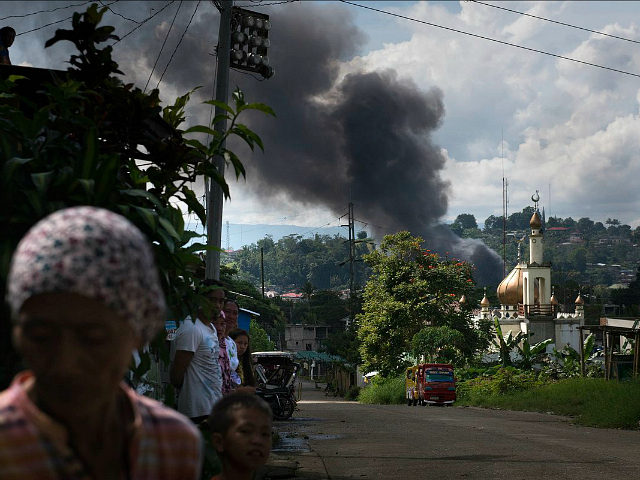The United States is reportedly considering a campaign of airstrikes, or to be more precise drone strikes, against Islamic State militants in the Philippines, a report suggested Tuesday.
Terrorist vassals of ISIS have been fighting an insurgency on the southern island of Mindanao since May, despite assurances from the Philippine government that they would be swiftly defeated.
NBC News notes there is already a small U.S. task force on the ground in Mindanao and American counterterrorism operatives have been active in the Philippines for at least 15 years. Intelligence assets, including some unarmed UAVs, have been provided to the Philippine military to assist their battle against the Islamic State.
In addition to adding armed drones to the mix, the Pentagon is reportedly considering a formal name for its anti-ISIS operation in the Philippines.
Joint Chiefs vice-chairman General Paul Selva told the Senate Armed Services Committee last month:
In every case where we see the resurgence of terror networks, particularly in the fragile areas of the southern Philippines, I think it’s worth considering whether or not we reinstate a named operation, not only to provide for the resources that are required, but to give the Pacific Command commander and the field commanders in the Philippines the kinds of authorities they need to work with indigenous Philippine forces to actually help them be successful in that battlespace.
One potential obstacle to deeper U.S. involvement on behalf of the Philippine government is the series of allegations against President Rodrigo Duterte for violating human rights in his war on drugs. Secretary of State Rex Tillerson said on Monday there was “no contradiction” between U.S. concern for human rights and its determination to assist Duterte in defeating ISIS.
“We’re providing them some training and some guidance in terms of how to deal with an enemy that fights in ways that is [sic] not like most people have ever had to deal with,” said Tillerson, who came to Manila for the ASEAN conference. “Bringing our knowledge of having dealt with this enemy in other parts of the world is useful to them, and I think that is also in our national security interest as well.”
Tillerson said the United States was determined to “get ahead” of ISIS in the Philippines, where he warned the Islamic State is “gaining a foothold.” He said the U.S. hoped to work more closely with other nations in the region on their own Islamic State threats.
Duterte, never one to be upstaged, declared, “I am your humble ally in Southeast Asia,” to Tillerson when the secretary of state visited him on Monday.
“They have considerably toned down in human rights. Nobody asked me about human rights,” Duterte said of his meetings with Tillerson and other foreign ministers, including Australia’s Julie Bishop. He implied he was able to to get some breathing room on human rights by showing unspecified foreign ministers documents that proved the severity of the drug and terrorism problems in the Philippines.
On Tuesday, Philippine Defense Secretary Delfin Lorenzana and Armed Forces chief Eduardo Año denied the NBC News report about possible U.S. drone strikes against ISIS. Ano said such strikes would violate the Philippines’ defense treaty with the United States, although both officials expressed appreciation for the Americans’ desire to help.
The situation on Mindanao, particularly in the ISIS-occupied city of Marawi, has grown dire indeed. Actually, as another NBC News report points out, hardly anyone occupies what remains of Marawi these days; after just a few months, the city already resembles the Southeast Asian version of Aleppo or Mosul.
A spokeswoman for the Philippine Army explained the stalled effort to recapture the area from ISIS by saying, “Philippine soldiers are good in jungle fighting, not in urban operations,” while Islamic State snipers are “very good – they do head shots all the time.”
The indigenous Islamic State force is a fusion of several well-established Islamist militant groups in the southern Philippines, but foreign reinforcements are pouring in from Indonesia and Malaysia, some of them said to possess dangerous military and terrorist training. Further reinforcements are expected as the Islamic State collapses in Syria and Iraq. Analysts fear ISIS will compensate for its losses by shifting resources to the Philippines and establishing a strong beachhead in Southeast Asia and ready access to the world’s largest Muslim nation, Indonesia.
One of the concerns voiced by residents of the Marawi region to USA Today is that heavy Philippine airstrikes have done even more damage than ISIS fighters. A surge of refugees is spreading out of the area. The appeal of switching over to precision U.S. drone strikes, before the sympathy of the population shifts to the Islamist militants, is obvious. However, accepting that level of American assistance might be embarrassing for the Philippine military.
It would also infuriate the militants. One of the groups fighting under the Islamic State banner, Bayan, released a statement on Tuesday saying it “opposes in the strongest terms U.S. plans to conduct airstrikes in the Philippines against ISIS-linked groups.”
“There can be no justification for allowing a foreign superpower with the world’s worst rights record to be conducting airstrikes on Philippine soil,” insisted Bayan Secretary-General Renato Reyes.
Reyes, like the defense officials working to defeat his organization, questioned the legality of U.S. airstrikes under Philippine law and said they would “violate our national sovereignty.”
“There is a concerted effort now on the part of several US agencies to push for an extended US role in the fight against ISIS, using the conflict as a pretext for permanent US basing and power-projection in Southeast Asia,” he charged, portraying the proposed drone strikes as the prelude to an American invasion of Mindanao.

COMMENTS
Please let us know if you're having issues with commenting.